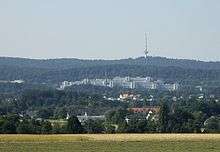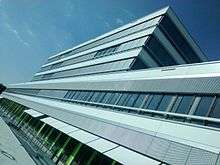Bielefeld University
Bielefeld University (German: Universität Bielefeld) is a university in Bielefeld, Germany. Founded in 1969, it is one of the country's newer universities, and considers itself a "reform" university, following a different style of organization and teaching than the established universities. In particular, the university aims to "re-establish the unity between research and teaching", and so all its faculty teach courses in their area of research. The university also stresses a focus on interdisciplinary research, helped by the architecture, which encloses all faculties in one great structure. It is among the first of the German universities to switch some faculties (e.g. biology) to Bachelor/Master-degrees as part of the Bologna process.
Universität Bielefeld | |
 | |
| Type | Public |
|---|---|
| Established | September 5, 1969 |
| Budget | € 230 million[1] |
| Chancellor | Dr. Stephan Becker |
| Rector | Gerhard Sagerer |
Academic staff | 1,387[2] |
Administrative staff | 1,100[2] |
| Students | 24,255[2] |
| Location | , , 52.03778°N 8.49306°E |
| Website | www.uni-bielefeld.de |
| [3][4] | |
Bielefeld University has started an extensive multi-phase modernisation project, which is to be completed by 2025. A total investment of more than 1 billion euros has been planned for this undertaking.[5]


Campus
The university is located in the west of Bielefeld next to the Teutoburg Forest. The main building, which houses all the faculties and institutes, as well as the large library, is a functional concrete structure, typical of the 1960s. The main building with 154,000m² alone is one of the largest structures in Europe.[6]
Intercity trains running between Cologne/Bonn and Berlin stop regularly at Bielefeld, and the university can be accessed via city tram (Line 4) in about 10 minutes from the city center—or in about 15 minutes by car. The nearest airport, Paderborn/Lippstadt, is about 50 kilometres southeast of Bielefeld.[7]
Library
Bielefeld University Library occupies most of the first floor of the main university building and contains over 2.2 million volumes. It is open every day of the year, from 08:00 until 01:00 Monday to Friday, and from 09:00 to 22:00 during weekends and public holidays.[8]
The library's projects include the development of tools to improve access to electronic resources. It works with commercial system suppliers to meet the needs of academic libraries—collaborations that have resulted in developments such as BASE (Bielefeld Academic Search Engine), by which metadata is collected from scientific repository servers and indexed, along with data from selected web sites and data collections, using the Solr framework.[9]
Organisation
Faculties
Bielefeld University is known for its faculty of sociology. It is associated with Norbert Elias and Niklas Luhmann, who were professors there. The faculty of history launched the "Bielefeld School" of Social History under Hans-Ulrich Wehler, while the Laborschule and Center for Interdisciplinary Research (ZiF) are projects of the faculty of educational science.
The university has the following faculties:
- Faculty of Biology[10]
- Faculty of Chemistry[11]
- Faculty of History, philosophy and theology[12]
- Department of History
- Department of Philosophy
- Department of Theology
- Faculty of Public Health[13]
- Faculty of Linguistics and Literature[14]
- Faculty of Mathematics[16]
- Faculty of Educational Science[17]
- Faculty of Physics[18]
- Faculty of Psychology and Sports[19]
- Faculty of Law[20]
- Faculty of Sociology[21]
- Faculty of Technology[22]
- Faculty of Business Administration and Economics[23]
Academic profile
Rankings
| University rankings | |
|---|---|
| Global – Overall | |
| ARWU World[24] | 501-600 |
| CWTS World[25] | 693 |
| THE World[26] | 166 |
| USNWR Global[27] | 526 |
| QS World[28] | 751-800 |
In 2017, Bielefeld University was ranked 22nd in the world by the Times Higher Education (THE) Young University Rankings,[29] and among the top 300 universities by the traditional Times Higher Education World University Rankings.
In the THE ranking of 2011 Bielefeld is placed among the top 50 universities in engineering and technology.[30]
In terms of mathematics, the Academic Ranking of World Universities of 2018 [31] places Bielefeld among the four best universities of Germany and 101-150 best universities in the world. The German Center for Higher Education Development Excellence Ranking, which measures academic performance of European graduate programs in biology, chemistry, mathematics, and physics, placed Bielefeld in the excellence group for mathematics.
Central academic institutes
- Center for Interdisciplinary Research (ZiF)
- Institute for interdisciplinary research on conflict and violence (IKG)
- CeBiTec - Center for Biotechnology
- CITEC - Cognitive Interaction Technology (Center of Excellence)
- Research Institute for Cognition and Robotics (CoR-Lab)
- Interdisciplinary Centre of Women's and Gender Studies
- Institute for the Simulation of Complex Systems (ISKOS)
- Institute of Mathemathical Economics (IMW)
- Research Centre for Mathematical Modelling (FSPM)
- Teacher Training Centre (ZfL - in German)
Oberstufen-Kolleg at the University of Bielefeld
The Oberstufen-Kolleg is a UNESCO Project School and as such it aims for international understanding and cooperation. Since 1998, the Kolleg has worked together with the German School of Guayaquil in a charitable project to help in the development of the town of Daular, Ecuador,[32] which project won a United Nations Award in 2006/2007 for its international concept.[33]
Protests against tuition fees
Bielefeld University was one of the centers of student protests in the fight against the introduction of tuition fees. In the course of the protests, the central hall and the university president's office were occupied by protesting students for over a month. In a vote organised by the AStA and the students parliament, about 94 percent of the participants voted against the introduction of tuition fees, although only 22 percent of the students cast their vote. This is comparable to similar results at other German universities.
In its session of July 12, 2006, the university senate decided to introduce tuition fees of €500 per semester, beginning in 2007.[34][35]
In August 2006, a universal key for the university went missing during a senate session. After that, multiple cases of arson and defacement of university property were reported. University president Dieter Timmermann was a particular target of these attacks. The cost of the damage, mainly due to the replacement of thousands of locks, was estimated at over a million euros.
See also
References
- "Daten.2016: Statistisches Jahrbuch" (PDF) (in German). Bielefeld University. pp. 55–62. Archived from the original (PDF) on 2019-02-14. Retrieved 2017-06-18.
- "Zahlen und Daten". University of Bielefeld (in German). Retrieved 2017-06-18.
- "Zeittafel zum Aufbau der Universität Bielefeld". Chronology of the university's development (in German). Universität Bielefeld. Archived from the original on 20 June 2008. Retrieved 2008-06-13.
- "Rektorat". University board (in German). Universität Bielefeld. Retrieved 2008-06-13.
- Campus Bielefeld
- "Renovation of the University of Bielefeld". Bielefeld University. Universität Bielefeld. Retrieved 2020-04-13.
- "First Contact". International Students. Universität Bielefeld. 2007-07-30. Archived from the original on 2007-11-30. Retrieved 2008-06-13.
- "Library Profile". Bielefeld University Library. Universität Bielefeld. Retrieved 2008-06-13.
- "About BASE". Bielefeld Academic Search Engine. Universität Bielefeld. Retrieved 2013-09-09.
- "Fakultät für Biologie". Faculty of biology (in German). Universität Bielefeld. Archived from the original on 2008-05-30. Retrieved 2008-06-13.
- "Fakultät für Chemie". Faculty of chemistry (in German). Universität Bielefeld. Retrieved 2008-06-13.
- "Fakultät für Geschichtswissenschaft, Philosophie und Theologie". Faculty of history, philosophy and theology (in German). Universität Bielefeld. Retrieved 2008-06-13.
- "Bielefeld School of public health". Fakultät für Gesundheitswissenschaften (Faculty of public health). Universität Bielefeld. Archived from the original on 2008-03-19. Retrieved 2008-06-13.
- "Fakultät für Linguistik und Literaturwissenschaft". Faculty of linguistics and literature (in German). Universität Bielefeld. Archived from the original on March 7, 2008. Retrieved 2008-06-13.
- "Abteilung Kunst und Musik". Department of art and music (in German). Universität Bielefeld. Retrieved 2008-06-13.
- "Fakultät für Mathematik". Faculty of mathematics. Universität Bielefeld. Archived from the original on 2008-03-19. Retrieved 2008-06-13.
- "Fakultät für Erziehungswissenschaft". Faculty of educational science (in German). Universität Bielefeld. Archived from the original on 8 June 2008. Retrieved 2008-06-13.
- "Faculty of physics". Universität Bielefeld. Archived from the original on 2008-06-19. Retrieved 2008-06-13.
- "Fakultät für Psychologie und Sportwissenschaft". Faculty of psychology and sports (in German). Universität Bielefeld. Archived from the original on 18 June 2008. Retrieved 2008-06-13.
- "Fakultät für Rechtswissenschaft". Faculty of Law (in German). Universität Bielefeld. Retrieved 2008-06-13.
- "Fakultät für Soziologie". Faculty of sociology (in German). Universität Bielefeld. Archived from the original on 17 July 2008. Retrieved 2008-06-13.
- "Technische Fakultät". Faculty of technology. Universität Bielefeld. Archived from the original on 2008-02-19. Retrieved 2008-06-13.
- "Fakultät für Wirtschaftswissenschaften". Faculty of business administration and economics. Universität Bielefeld. Archived from the original on 2008-09-17. Retrieved 2008-06-13.
- "Bielefeld University". Academic Ranking of World Universities. Shanghai Ranking Consultancy. 2018. Retrieved October 23, 2018.
- "Bielefeld University". CWTS Leiden Ranking. University of Leiden. 2018. Retrieved October 23, 2018.
- "Bielefeld University". Times Higher Education. 2020. Retrieved January 15, 2020.
- "Bielefeld University". US News and World Reports - Education. U.S. News & World Report, L.P. 2018. Retrieved October 23, 2018.
- "Bielefeld University". QS World University Rankings. Quacquarelli Symonds. 2018. Retrieved October 23, 2018.
- "Times Higher Education (THE) Young University Rankings 2017". Times Higher Education World University Rankings.
- "Top 50 Engineering & Technology universities". Times Higher Education World University Rankings.
- "ARWU in Mathematics - 2017". Academic Ranking of World Universities.
- "Kooperationsvertrag" (PDF). German School Guayaquil-University of Bielefeld (in German). Universität Bielefeld. Archived from the original (PDF) on May 18, 2006. Retrieved 2009-02-20.
- "Das etwas andere Abitur". Bielefeld Marketing (in German). Bielefeld Marketing. Archived from the original on 2008-11-14. Retrieved 2009-02-20.
- "Senat der Universität Bielefeld beschließt Studienbeiträge" (PDF). Senate of the University of Bielefeld decides tuition fees (in German). Universität Bielefeld. Archived from the original (PDF) on 2009-03-16. Retrieved 2008-06-13.
- "Einige wichtige Informationen zur Erhebung von Studienbeiträgen an der Universität Bielefeld" (PDF). Some important information about the collection of tuition fees at the University of Bielefeld (in German). Universität Bielefeld. Archived from the original (PDF) on 2009-03-16. Retrieved 2008-06-13.